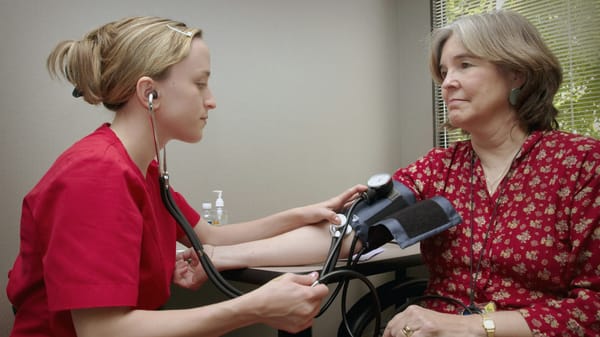Ozempic: Unmasking the Dark Side of America's Latest Weight Loss Craze
Imagine a nation where 80% of adults are overweight, and a "miracle" drug promises a quick fix - but what if Ozempic is just a Band-Aid on a deeper problem, and what are the hidden dangers we're not being told?

In a nation grappling with an obesity epidemic, a new "miracle" drug has emerged, promising effortless weight loss and improved health. Ozempic, originally developed for diabetes, has become important among celebrities, influencers, and everyday Americans alike singing its praises. But beneath the glossy talk of quick-fix solutions lies a troubling reality.
Imagine a world where 80% of adults and 50% of teens are overweight, where pre-diabetes affects up to 60% of the population, and where 25% of teens suffer from fatty liver disease – a condition once reserved for elderly alcoholics.
This isn't a dystopian future; it's the United States today. In this landscape of deteriorating health, Ozempic has been portrayed as the solution. But what if this "cure" is merely hiding a deeper, more insidious problem?
Calley Means, a former pharmaceutical industry insider is sounding the alarm on what he calls "the Rosetta Stone to understanding what's gone wrong in healthcare and frankly Pharma industry corruption". Means argues that Ozempic isn't just ineffective in the long term – it's potentially dangerous, with side effects ranging from stomach paralysis to increased risk of depression and suicidal thoughts.
As we peel back the layers of this complex issue, we're forced to confront uncomfortable truths about our food system, government policies, and the pharmaceutical industry's influence on public health. Are we truly addressing the root causes of our nation's health crisis, or are we simply treating symptoms while ignoring the disease? Let’s uncover the startling realities that Big Pharma doesn't want you to know.
The Bitter Pill: The Hidden Dangers of Ozempic
In the face of America's escalating obesity crisis, Ozempic has emerged as a seemingly miraculous solution. However, beneath its promise of effortless weight loss lies a complex web of medical, ethical, and societal concerns that demand scrutiny.
Ozempic, originally developed for diabetes treatment, has gained significant traction as a weight loss aid in the United States. Yet, its rapid rise to prominence raises alarming questions about its safety and efficacy. The drug's mechanism of action essentially induces a form of stomach paralysis, leading to potentially severe gastrointestinal complications. Reports of prolonged digestive issues, even after discontinuation, have sparked lawsuits and growing concern within the medical community.
Perhaps more troubling is the drug's questionable long-term efficacy. Many patients experience rapid weight regain upon ceasing medication, creating a "yo-yo" effect that may pose additional health risks. This pattern undermines the drug's purported benefits and raises questions about its viability as a sustainable weight loss solution.
The European Union's recent probe into the link between Ozempic and suicidal ideation adds another layer of concern. This investigation stems from numerous reports of increased depression and suicidal thoughts among users. The potential connection may lie in the gut-brain axis, as 95% of serotonin, a key mood-regulating neurotransmitter, is produced in the gut.
By disrupting gut function, Ozempic may inadvertently be tampering with patients' mental health, a side effect with potentially far-reaching consequences.
Despite these red flags, the American Academy of Pediatrics has taken the controversial step of recommending Ozempic as a first-line treatment for obesity in teenagers. This decision has ignited heated debate within the medical community, raising serious questions about the integrity of medical guidelines and the potential influence of pharmaceutical companies on healthcare recommendations.
It's worth noting that while Ozempic has gained significant traction in the United States, it remains unapproved for obesity treatment in most European countries. This stark contrast in regulatory approaches highlights the need for a more cautious and comprehensive evaluation of the drug's risks and benefits.
As we grapple with the complexities of the obesity epidemic, it's crucial to look beyond quick fixes and address the root causes of this health crisis. Environmental factors, dietary habits, and systemic issues within our healthcare and food production systems all play significant roles. Rather than relying on potentially dangerous pharmaceutical interventions, we must advocate for a more holistic approach to health and wellness that prioritizes prevention and sustainable lifestyle changes.
The Need for Systemic Change: Reimagining America's Healthcare Landscape
The United States healthcare system, despite being the largest and fastest-growing industry in the country, paradoxically yields poor health outcomes. This stark contradiction is exemplified by the fact that the U.S. spends more on managing diabetes than on national defense, highlighting a system that prioritizes treatment over prevention.
To address this systemic failure, a multifaceted approach is necessary. First and foremost, we must clean up the environmental and dietary factors contributing to obesity. This includes reevaluating government subsidies that currently favor processed foods and redirecting support towards healthier alternatives. Simultaneously, increasing transparency and managing conflicts of interest in medical research is crucial to ensure unbiased, patient-focused outcomes.
Reducing reliance on pharmaceutical treatments for chronic conditions is another critical step. Instead, promoting lifestyle changes such as improved diet and regular exercise should be at the forefront of health management strategies. Medical professionals should be encouraged to prescribe these lifestyle modifications as primary interventions, rather than defaulting to medication.
The influence of pharmaceutical companies on public perception and policy must also be curtailed. Restricting pharmaceutical advertising on television would be a significant step towards reducing their outsized influence on media and public opinion. Additionally, revising NIH policies to eliminate conflicts of interest in research funding would help ensure that scientific studies are conducted with public health, not profit, as the primary motivator.
Public education plays a vital role in this systemic change. By focusing on the benefits of healthy living and addressing root causes of health issues rather than merely treating symptoms, we can empower individuals to take control of their well-being. This shift in focus from treatment to prevention should be reflected in government policies, including a reevaluation of funding for drugs that manage rather than cure conditions.
Addressing systemic corruption in healthcare and pharmaceutical industries is paramount. This includes implementing policies that incentivize healthier food production and consumption, as well as advocating for a holistic approach to health and wellness that considers all aspects of an individual's lifestyle and environment.
By implementing these comprehensive changes, we can begin to shift the U.S. healthcare system from a reactive, treatment-focused model to a proactive, prevention-oriented approach. This transformation is essential not only for improving public health outcomes but also for creating a more sustainable and equitable healthcare system for all Americans.
The Pharmaceutical Industry's Web of Influence
In the complex landscape of American healthcare, pharmaceutical companies wield an outsized influence that extends far beyond the development and distribution of drugs. This pervasive reach has created a system that often prioritizes profit over public health, with far-reaching consequences for patients and society at large.
At the heart of this issue lies the pharmaceutical industry's strategic funding of medical research. By bankrolling studies, these companies can subtly shape the direction and outcomes of scientific inquiry. This influence doesn't stop at the laboratory door; it extends to the very doctors who prescribe medications. Through speaking fees, consulting arrangements, and other financial incentives, pharmaceutical companies cultivate relationships with healthcare providers that can influence prescribing habits.
Perhaps most troublingly, this web of influence has even ensnared civil rights groups. In a particularly egregious example, certain organizations were reportedly paid to argue that restricting soda purchases with food stamps was racist – a move that directly benefits companies producing unhealthy, obesity-promoting products.
The media, our supposed watchdog, is not immune to this influence. A staggering 50% of TV news funding comes from pharmaceutical companies, creating an environment where critical reporting on drug-related issues is often muted or nonexistent.
This financial leverage allows the industry to shape public perception and stifle dissenting voices.
The result of this systemic corruption is a healthcare model that paradoxically profits from prolonged illness rather than prevention. Instead of addressing root causes of health issues, the system often favors long-term drug treatments that manage symptoms without curing underlying conditions. This approach ensures a steady stream of patients – and profits – for both pharmaceutical companies and healthcare providers.
Consider the case of Ozempic, a diabetes drug now being touted as a weight loss solution. Despite potential side effects and questionable long-term efficacy, it's being aggressively marketed to a population struggling with obesity. The drug's manufacturer has become Europe's most valuable company, largely by capitalizing on America's health crisis.
This situation underscores a fundamental misalignment of incentives in our healthcare system. When profit motives supersede public health concerns, we all lose. As consumers and citizens, we must demand greater transparency, stricter regulations on pharmaceutical influence, and a shift towards preventative care. Only by addressing these systemic issues can we hope to create a healthcare system that truly prioritizes health over wealth.
The Weight of Hope: A Personal Journey
As she stood on the scale, watching the numbers climb higher than ever before, Sarah felt a mix of desperation and hope. Her doctor had just suggested Ozempic, praising it as a miracle solution for her weight struggles and creeping pre-diabetes. The promise of effortless weight loss was intoxicating.
But something nagged at her. She thought of her grandmother, who always said, "If it seems too good to be true, it probably is." So Sarah dug deeper, researching beyond the glossy ads and celebrity endorsements.
What she found shocked her. Stories of stomach paralysis, depression, and weight regain flooded online forums. Sarah realized that this "quick fix" was masking deeper issues – the food system, lifestyle choices, and a healthcare model profiting from prolonged illness.
That day, she made a different choice. Instead of reaching for a prescription, Sarah overhauled her pantry, joined a local CSA, and started walking daily. It wasn't easy, but as the pounds slowly melted away, she felt truly empowered. She had taken control of her health, addressing the root causes rather than just treating symptoms.
Sarah's journey taught her that true health isn't found in a pill but in the choices made every day. Her story serves as a reminder that while quick fixes may seem appealing, lasting change comes from addressing the underlying issues that contribute to our health crises.
Your Top Questions Answered
Is Ozempic a safe and effective solution for weight loss?
While Ozempic may lead to short-term weight loss, it comes with significant risks. Side effects can include stomach paralysis, gastrointestinal issues, and potential mental health impacts. Additionally, many patients regain weight after stopping the medication.
Why isn't Ozempic approved for obesity treatment in most European countries?
Despite being developed by a European company, Ozempic is not approved for obesity treatment in most European countries. This is due to concerns about its long-term efficacy and safety profile. European regulators have taken a more cautious approach compared to the U.S.
How does Ozempic work?
Ozempic essentially induces a form of stomach paralysis, which affects the body's ability to process food. This mechanism can lead to weight loss but may also cause persistent digestive issues, even after discontinuing the drug.
What are the potential mental health risks associated with Ozempic?
The European Union has launched a probe into reports of increased depression and suicidal ideation linked to Ozempic use. This concern stems from the drug's impact on gut function, which plays a crucial role in serotonin production and mood regulation.
Why is the pharmaceutical industry promoting Ozempic so heavily?
The promotion of Ozempic reflects a larger issue of pharmaceutical influence in healthcare. With potential annual costs of $20,000 per patient and a large target market, Ozempic represents a significant profit opportunity for its manufacturer, which has become Europe's most valuable company largely due to U.S. sales.
What alternatives exist for addressing obesity and metabolic health issues?
Experts recommend focusing on root causes, including environmental and dietary factors. This involves promoting lifestyle changes, adjusting government policies on food subsidies, and advocating for a more holistic approach to health and wellness that prioritizes prevention over pharmaceutical intervention.
10 Key Takeaways
- Ozempic's popularity is a symptom of a larger issue: The widespread use of Ozempic for weight loss highlights the severity of the obesity epidemic in the US, where 80% of adults and 50% of teens are overweight.
- The drug's mechanism of action has potential risks: Ozempic works by inducing stomach paralysis, which can lead to severe gastrointestinal complications, including prolonged digestive issues even after discontinuation.
- Long-term efficacy is questionable: Many patients experience rapid weight regain after stopping Ozempic, creating a "yo-yo" effect that may pose additional health risks and undermine the drug's benefits.
- Mental health concerns are a potential side effect: The European Union's investigation into the link between Ozempic and suicidal ideation raises concerns about the drug's impact on mental health, particularly given its potential to disrupt gut function and serotonin production.
- Pharmaceutical industry influence is a concern: The American Academy of Pediatrics' recommendation of Ozempic as a first-line treatment for obesity in teenagers has sparked debate about the potential influence of pharmaceutical companies on healthcare guidelines.
- Regulatory approaches vary globally: Ozempic remains unapproved for obesity treatment in most European countries, highlighting the need for a more cautious and comprehensive evaluation of the drug's risks and benefits.
- Quick fixes are not a sustainable solution: Relying on pharmaceutical interventions like Ozempic may not address the root causes of the obesity epidemic, which include environmental factors, dietary habits, and systemic issues within healthcare and food production systems.
- A holistic approach to health is necessary: To effectively address the obesity crisis, it's essential to prioritize prevention and sustainable lifestyle changes, rather than relying on potentially dangerous pharmaceutical interventions.
- The gut-brain axis plays a crucial role in health: The potential connection between Ozempic's disruption of gut function and increased risk of depression and suicidal thoughts highlights the importance of considering the gut-brain axis in healthcare decisions.
- Critical evaluation of medical guidelines is essential: The controversy surrounding Ozempic's recommendation for obesity treatment in teenagers underscores the need for careful evaluation of medical guidelines and consideration of potential conflicts of interest within the pharmaceutical industry.
Resources
This article was written by Ariadna Paniagua, an experienced writer and editor for several institutions, papers, and websites.




